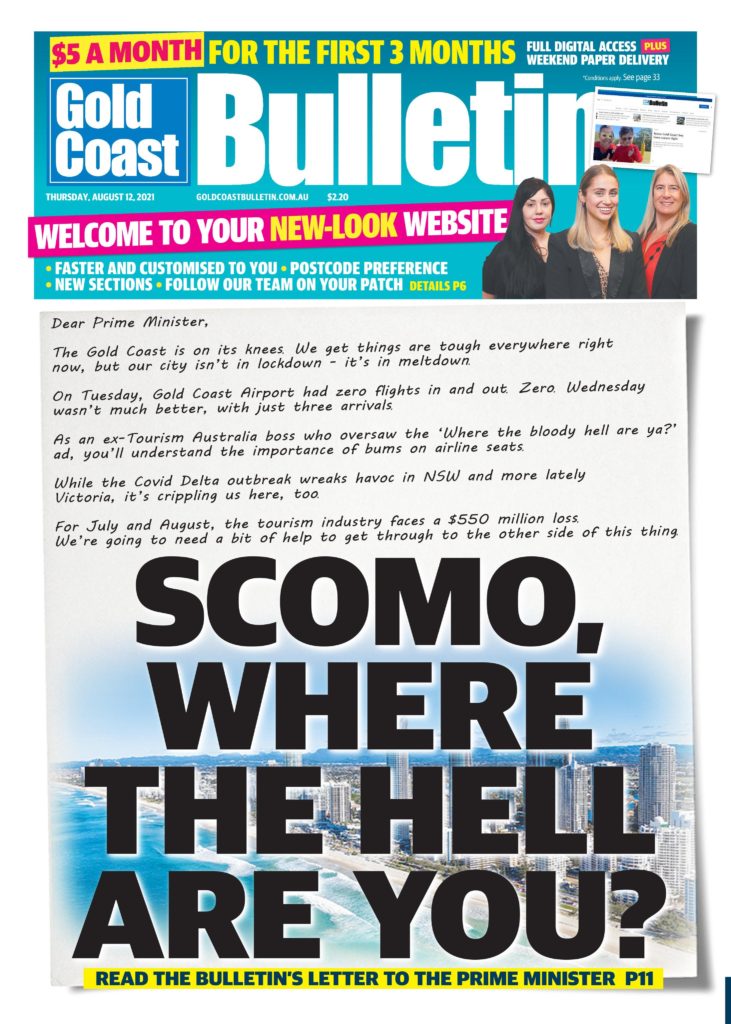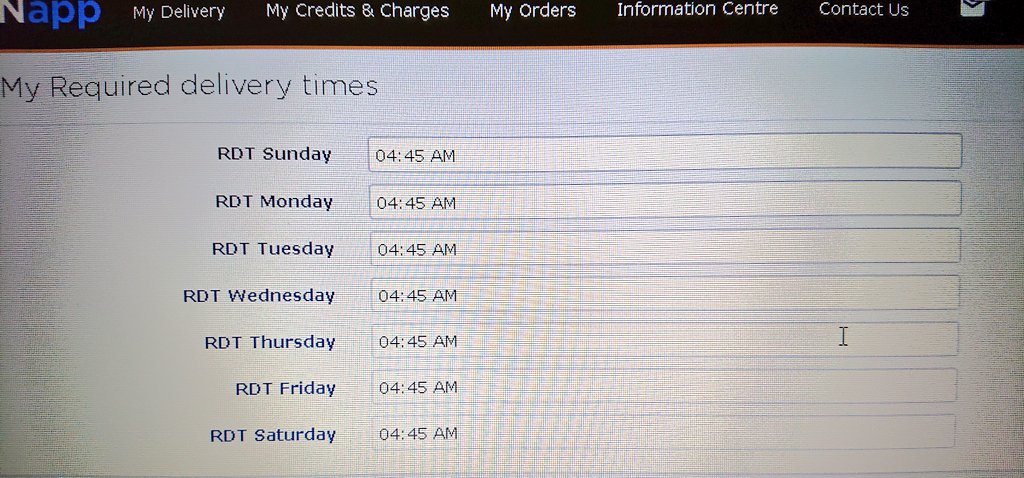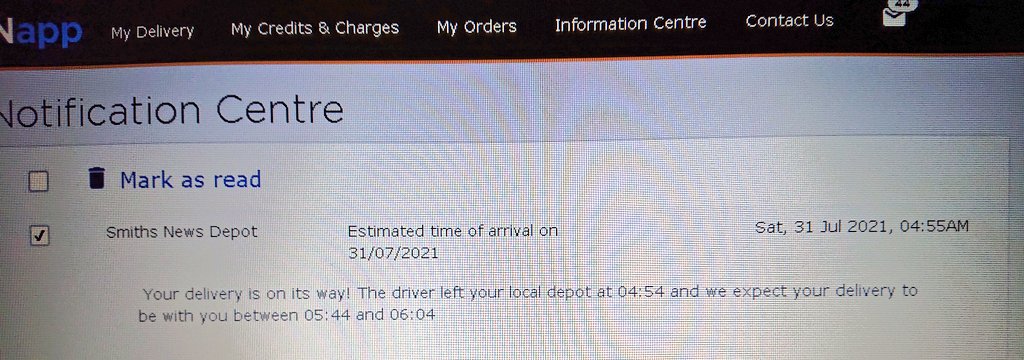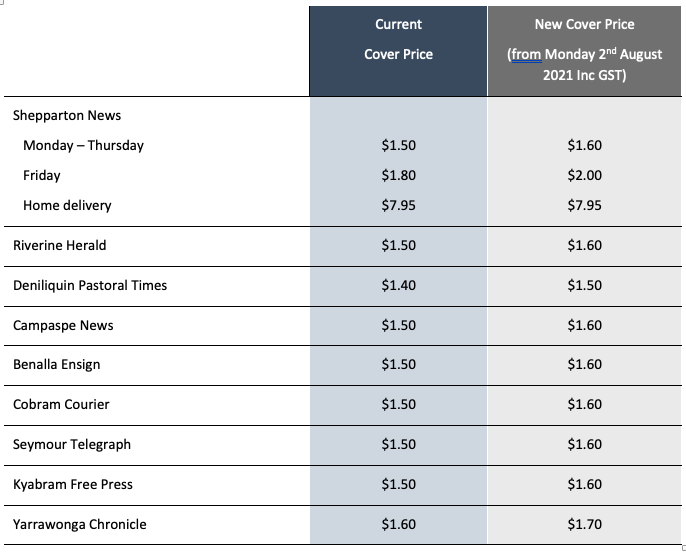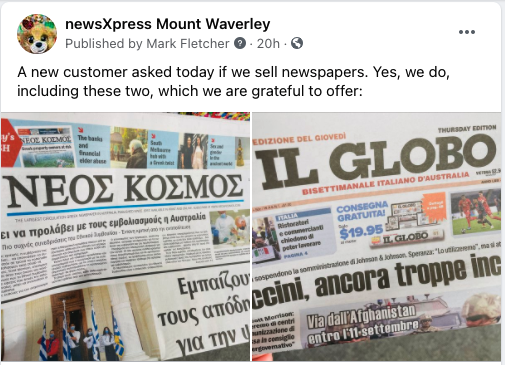Interesting use of tech in newspaper distribution in the UK
I am grateful to a UK newsagent for sharing these screen shots. On this screen we can see that they can set the required delivery time by day for newspapers.
In this image we can see the advice from the distributor as to when newspapers are likely to be available.
Newspaper publishers in Australia have failed newsagents on the technology front for years. Their disinterest in helping newsagents better serve customers is a factor in declining newspaper sales.
The screen shots from technology in the UK suggest access to a tech platform with useful tools that newsagents can use and rely on to provide better customer service.
Customers angry at newspapers not arriving until 10:30am
I heard from a newsagent in a major regional town in NSW this week who regularly receives newspapers at their shop at around 10:30am. What used to be 6am delivery is so late that customers are stopping purchasing the newspapers.
Part of the problem is the late delivery ion papers top a distribution depot. The main problem, though, is they supplier to the retail newsagent does not prioritise that last step delivery.
Despite calls and emails, publisher representatives appear to have little appetite for resolution. Now, if anyone says speak to an association, this should not be necessary. The publisher is already well aware of the problem. Their care factor is zero.
I feel for newsagents who are trying to serve their local communities and who face disinterest by newspaper publisher reps in getting papers consistently delivered on time.
This is a mental health issue as much as a customer service issue. The mental health of some newsagents is being challenged by late papers and the failure within newspaper pu listing businesses to have a process through which this can be reasonably addressed.
Here’s what I think should happen – newsagents should obtain the direct mobile number for a senior newspaper circulation executive and hand that out to any customer who complains about late papers. This would lead to the problem being resolved.
Nine Media increases newspaper cover price 20 cents and given small business retailers only half a cent increase
The Age goes up 20 cents today. There was a time when we’d celebrate a newspaper cover price rise, a time when that 20 cent increase would mean and extra 3 cents margin. Hey, 3 cents is 3 cents, especially for a volume product.
Thanks to margin setting changes by Nine Media, retail newsagents will receive half a cent from the 20 cent cover price increase. The margin from The Age is 8%.
Half a cent. And, with newspapers now low volume product in many newsagencies, the value of this paltry increase is nil.
I wonder if Nine Media has cut the margin small business retail newsagents make from newspapers because they know there is no risk as stocking newspapers makes the business essential.
Regardless of the reason, this move by Nine Media is offensive. Here we have small business newsagents facing a labour cost increase in a few months, the annual rental increase of 5% and other costs going up and they are cutting what newsagents make in real terms.
This is not a socially responsible move by Nine Media. It disrespects small business retailers who have few levers available to enable them to deal with operating cost increases.
But, for the most part, m this move will go unnoticed … because newsagents are used to being treated this way, they put up with it out of fear I guess.
Recommended social media pitch if you are in lockdown
 If you are in lockdown I recommend daily social media pitches featuring the front page of newspapers, including foreign language newspapers. This is a reminder that you are open and reinforces the essential nature of your business.
If you are in lockdown I recommend daily social media pitches featuring the front page of newspapers, including foreign language newspapers. This is a reminder that you are open and reinforces the essential nature of your business.
It’s the type of subtle post that could work well for you in the current conditions. It’s you reminding people without being pushy or offending owners of nearby businesses that are closed.
I have done it for my shops through each of the Victorian lockdowns and it has worked well.
I keep the posts simple and leave the newspaper itself as the hero.
Were newsagents obligated to sell the Herald Sun yesterday at $2.00?
There Herald Sun newspaper had the wrong price on the cover, as I noted here yesterday.
Reps from the publisher advised newsagents to keep track of sales at $2.00 and that they would credit the newsagents.
Please be aware the incorrect cover price of $2 was printed on the Herald Sun today, Wednesday 30th June 2021.
The correct cover price is $2.20, and this is what should scan when using the barcode.
If customers insist on paying the printed cover price today of $2 it should be honoured.
To avoid being out of pocket, please advise us via email to newsagents@news.com.au the route number and number of customers that paid the reduced price for the Herald Sun and we will apply a credit to your account.
Please call us on 1800 639 700 if you have any other queries.
I have three comments about this:
- Poor communication channels meant that plenty of retail only newsagents did not get that ‘memo’.
- Some distribution newsagents made up their own rules when advising retail newsagents.
- The publisher advice is not supported by consumer law. Nor is it supported by the voluntary Code of Practice for Computerised Checkout Systems in Supermarkets.
This supermarket code sets out procedures employees in a store must follow in the event of incorrectly priced items. In one example, if an item scans at a higher price than the price listed on the shelf, the customer is entitled to receive the item free (assuming the look-up number is correct). I wonder if this happened.
What the newspaper publisher could / should have said is follow your in-store policy as it is this policy that should lay out how you handle an incorrectly priced item.
In my stores, the price of any item that arrives in store with the price permanently printed or marked on it is the price. That is is the price we sell the item for. So, in our situation, all Herald Suns sold yesterday were sold at $2.00.
Consumer law is governed by the Australian Consumer Law (ACL). This requires prices to be clear and correct, so that they do not mislead consumers. Pricing must not leave consumers with a false impression as regards pricing.
It was wrong of the publisher to expect retail newsagents to deal with their publishing mistake. I think a smarter move would have been to be very public about the mistake and promote it as a deal for the day. I suspect there would have been a sales jump as a result, and considerably less stress for newsagents. yesterday was a missed opportunity.
This may seem like a small issue. All it would take is for one customer to make it big. They could make it even bigger by comparing how a newsagent would handle this versus a supermarket.
To me, the issue reflects out of date practices in our channel, practices that root us in how things were done too many years ago. We need to grow up.
Is News Corp considering print changes in Queensland?
The frustration with late newspapers is being expressed by customers and newsagents in Queensland. So frustrated are some newsagents that they are actively discussing quitting the category as the grief of late papers is not worth it.
Newsagents getting newspapers from News Corp. after 10am each day makes for a tough day in the shop, understandably.
I’ve been told that News Corp. execs have were meeting last week to discuss making further changes to fix the late newspaper problem.
News UK writes the value of The Sun newspaper down to zero
News Group Newspapers, a subsidiary of News UK, has written down the book value of The Sun newspaper to zero, reports The Guardian:
Rupert Murdoch has written down the value of the Sun newspapers to zero as the impact of the Covid-19 pandemic helped to fuel a £200m loss at his flagship tabloid titles.
Advertising and sales revenues at the Sun and the Sun on Sunday plummeted, with turnover falling by 23% from £419.9m to £324m in the year to the end of June 2020.
The torrid market conditions, coupled with one-off charges related to ongoing legal action over allegations of historical phone hacking, led to pretax losses more than tripling from £67.8m in 2019 to £201.4m.
As a result News Group Newspapers, the subsidiary of News UK that operates the two titles, wrote down their value to zero. The £84m non-cash “impairment of publishing rights” essentially means the publisher does not believe the titles will return to positive growth.
Another factor is the value of the daily print newspaper as an advertising platform. As more ad dollars flow online and elsewhere, the economic value of the print product fades.
Late newspapers … ouch
Am I wrong to think it’s not OK to deliver a daily #newspaper several days late?? Does the paper delivery person go camping on long weekends, because this happens every time🤯 @TheNTNews @australian @newscorp @abcdarwin #auspol https://t.co/xdZBhOIaWM pic.twitter.com/OZrZbVTHwt
— Jo Laverty (@jo_laverty) May 3, 2021
@SatPaper @madconnaughton what is happening with the distribution? 2 out of 3 weeks no paper at my newsagent in Carrara on Gold Coast. Not happy. We are fighting an uphill battle as it is with MSM but we need our Sat dose of sanity
— Dame Nasty (@kyliesjacques) May 29, 2021
Regional / rural newspapers far from dead
The Conversion recently published a terrific report on the results of a comprehensive survey of 4,200 country newspaper readers.
Newspaper readers in rural and regional Australia are five times more likely to go directly to their local newspaper website than Google or Facebook for local information, and almost 10 times as likely to go to their local news website over a council website for news and information.
Nearly two-thirds of local newspaper readers also indicate policies affecting the future of rural and regional media would influence the way they vote at the next federal election.
These are some of the key findings of a national survey of almost 4,200 Australian country newspaper readers we recently conducted as part of a project to drive greater innovation in the rural and regional media landscape.
The report is worth reading, especially if your business is in regional / rural Australia as to reflect the value association with newspapers in these locations, value documented in the evidence of this professional and thorough research. The results are especially supportive of print:
Many respondents expressed resistance to their newspaper being made available in digital format only. They offered comments such as:
There is always room for improvement, but if this newspaper went digital, I would not be interested.
And this from another:
The day it goes digital only will be the day I stop reading it.
Our survey also found that respondents overwhelmingly (86%) view a printed copy of their newspaper as an essential service for their community.
Newsagents already know the value of local independent newspapers. They see it in their shops.
I guess what’s interesting to me is the growth in this space on the back of News Corp. closing so many of their local papers last year.
Front page story at The West Australian revealed as misleading?
Myth making in the age of the #ANZAC industry. This attempt to spin some heroic fake news by @westaustralian to sell papers is appalling.
The “veteran” turns out to be an anti-lockdown, One Nation staffer, who is not a veteran at all.
Just shameful, all round. pic.twitter.com/XfXOS2rZSP— Francis Leach (@SaintFrankly) April 25, 2021
Pitching foreign language papers
While I rarely pitch magazines or local capital city newspapers on social media pages for my retail businesses, I do regularly pitch foreign language and niche newspapers as they are the titles more likely to attract new shopper traffic in my experience.
I keep the posts simple, and always include cover shots …
Personal service disappears with News Corp changes to newspaper home delivery
Back in the day, if you had an issue with newspaper home delivery, you could speak with your local newsagent and, usually, it would be fixed. Today, for many Australians, thanks to the changes led by News Corp, changes that have ripped newspaper home delivery away from local newsagency businesses, you often have to deal with a faceless, not local, call centre.
One home delivery customer told me this week that the process was so broken that they cancelled their subscription. They were a 7 day a week customer. The issue was the paper being left at the wrong entrance to their apartment complex. The delivery was to a foyer 5 metres for their foyer. They told me that contact to report the issue took more time that the paper was worth.
Another person told me of their experience at receiving the paper without having ordered it. They spoke to the local newsagent who advised they no longer did deliveries. The person receiving the free paper called the number the newsagent provided. After a couple of calls they gave up and decided to lean into the daily free paper.
For all their noise to home delivery customers about the changes providing a better experience, the anecdotal evidence is that the experiences are worse, more disconnected and certainly not local. I wonder if these experiences will be noted as a reason for a decline in newspaper sales.
Newspaper home delivery in Australia, while often loss making for newsagents, was an appreciated local service. News Corp has led the changes that have dismantled this much loved service.
News Corp newspaper printing move to Yandina print site is delaying newspapers
Newspaper customers in Brisbane who are frustrated with newspapers being delivered later may want to talk to News Corp.
the company has relocated printing from the more central Brisbane print site to a site in Yandina. This is adding, I am told between an hour and an hour twenty to newspaper delivery times, which is being felt in delivery times achieved ex newsagency home delivery businesses.
Newsagents are not to blame for late newspapers flowing from this decision by News Corp. and the execution that has followed.
Representations to News Corp. are falling on deaf ears. It’s like the company no longer treats the print platform of its ‘news’ as important.
Newsagents are frustrated, customers are frustrated, delivery contractors at various points in the chain are frustrated. Once newsagent offered to go to the depot to pick up product themselves. This request was denied.
For a service for which newsagents are paid less than a fair living wage, News Corp. certainly offers little respect in terms of these recent operational decisions.
Nine Media fails newsagents on Easter supplies
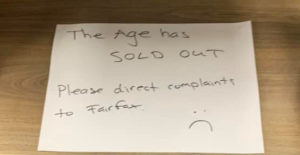 The hack of Nine Media meant the company had to request quantity orders from newsagents via email. For some, though, that was a waste of time. They were not supplied what they ordered, not even close, and sold out by early morning. A missed opportunity for this newspaper company that is challenges on several fronts.
The hack of Nine Media meant the company had to request quantity orders from newsagents via email. For some, though, that was a waste of time. They were not supplied what they ordered, not even close, and sold out by early morning. A missed opportunity for this newspaper company that is challenges on several fronts.
In attacking Samantha Maiden, The Australian Financial Review plays politics, not news, again
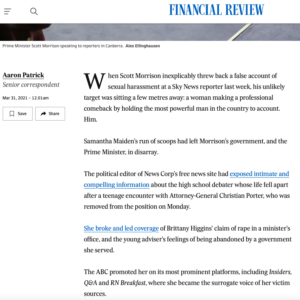 The hatchet job by Aaron Patrick on Samantha Maiden published in The Australian Financial Review today is yet another example of Nine Media outlets ditching news for political engagement / interference, and another reminder that paying to access biased trash is a waste of money. In this week of the Nine hack, surely they had better priorities.
The hatchet job by Aaron Patrick on Samantha Maiden published in The Australian Financial Review today is yet another example of Nine Media outlets ditching news for political engagement / interference, and another reminder that paying to access biased trash is a waste of money. In this week of the Nine hack, surely they had better priorities.
That the Patrick ‘story’ got through the editorial process and published speaks to how weak Nine Media has become. That the story remains publicly available, and not behind their paywall, speaks to the objective of the piece.
In my opinion, this ‘story’ by Patrick is another shitty interfering and biased article in a shitty publication that cares little for evidence based reporting.
It’s an embarrassment to have The Australian Financial Review on the shelf – because of the lobbying in which it engages daily and it’s tiny size for such a high price. I guess the only redeeming feature is that it’s not a News Corp. title.
Why are newsagents the only outlet for the House of Wellness magazine?
News Corp. is promising the next issue of the House of Wellness, the crappy (my opinion) ad platform from Chemist Warehouse. News Corp. is clear that it is only available from newsagents in their FAQs:
FAQ’s
Q. How can I get a magazine?
A. Purchase The Courier-Mail on Saturday April 3 or The Sunday Mail on April 4 and present the original token from the newspaper at participating newsagents to redeem.
Q. Can I get the magazine from supermarkets or petrol stations?
A. No, the magazine is only available from participating newsagents in QLD.
Q. Can I get more than one magazine?
A. No, one magazine per purchase of the paper. If you would like a second copy, you must purchase a second copy of the paper.
Q. Do I need to pay for the magazine?
A. The magazine is free with purchase of The Courier-Mail on Saturday April 3 or The Sunday Mail on April 4, while stocks last and only at participating newsagents.
Q. Is my newsagent participating?
A. Click here to see a list of participating newsagents.
Q. The magazine isn’t inserted into my paper, what do I do?
A. The magazine is not inserted in the paper. You will need to visit a participating newsagent, present the original token from within the paper purchased on April 3 or 4, then you will receive your magazine.
So, why is the House of Wellness only available from newsagents? I suspect because supermarkets, convenience outlets and petrol stations have not agreed the paltry terms for handling this advertising product, because newsagents are the only ones prepared to accept less than minimum wage for handling this title, for putting top with people who buy their paper elsewhere and come to the newsagent for the free title, people who will be angry they had to wait in line to get their free title.
News Corp. to reduce newspaper distribution in regional Queensland
The ABC has just published this story about a decision by News Corp. to scale back print newspaper distribution in regional Queensland:
News Corp Australia to stop distributing newspapers to much of regional Queensland
News Corp Australia has notified a number of newsagents across regional Queensland that it will stop delivering its titles to them from late September, due to the “very high cost” of distribution.
News Corp wrote to select newsagents last Thursday, informing them it would no longer provide physical copies of eight mastheads, including The Courier-Mail, The Australian and The Daily Telegraph, after September 26.
The ABC understands distribution will cease to towns further west than Charters Towers in the north, Emerald in central Queensland and in some parts of the state’s south-west.
The move leaves a large swathe of Queenslanders without access to a daily newspaper covering state, national and international affairs.
In the letter seen by the ABC, News Corp Australia said its decision was based on “the very high cost to distribute to your region, in the context of how people access their news today, [which] makes its continuation unsustainable”.
News Corp. issued this statement to the ABC:
We are following our audience — and our advertisers — to where they consume news and information, allowing our news coverage to be more immediate and focused on our communities. While our changes in western Queensland represent about 1 per cent of state newspaper sales, the true value of a newspaper is in the news, not the paper it’s printed on.
Read the whole ABC story: as it goes into detail and quotes several newsagents.
Here’s the thing … print in not an efficient medium for the distribution of news and opinion. Sales of newspapers have been underline for close to 20 years. The moves being made by News Corp. in Queensland will not be the only such moves.
As I have written here over the years, the only issue to be resolved about the retreat and ultimate closure of print newspapers is the timing.
Newsagents need to run their businesses so as to not rely on newspapers or any legacy products. Hopefully, the story this morning from the ABC encourages more newsagents to pivot.
Now, as to News Corp. itself, it has not dealt with and is not dealing with these decisions in an inclusive way. It is being selfish and secretive. but, hey, that’s News Corp for you. I say selfish and secretive because company representatives tell newsagents they are important, that they support them, that they need them. Unfortunately, too many newsagents and some who support newsagents drink and that kool-aid and fall into line with the News Corp. spin.
News Corp. should be transparent with newsagents about its timeline. Yes, I am sure it has a timeline that documents the trigger points for withdrawing distributions like that covered in the ABC story this morning and even bigger moves like when it will close capital city dailies. I get why it is not transparent …/ but I wish it was as, sadly, there are newsagents who believe News Corp. more than they believe their own sales data.
I support newspapers in newsagencies, but only on terms that are viable for newsagents. By that I mean being frugal in space and labour allocation while at the same time aggressively attracting new shoppers for new product categories that offer growth opportunities into the future.
Anyone involved in print newspaper production, distribution and sale is involved in an activity that will end … soon. Everything being done needs to be done on the basis of pursuing a soft landing. That is what News Corp. is doing with these decisions. If I was a News Corp. shareholder;der I’d be supporting their moves.
Do News Corp and Nine Media have newspaper billing issues?
A newsagent recently received a bill from Nine Media claiming a refund for papers not delivered going back eight years. Nine Media, and prior to them, Fairfax, had been paying for delivery that was not done. Many thousands of dollars involved.
Another newsagent was direct debited by News Corp twice for the same amount for the same product. Making the situation challenging is that there is no name on the communication from News Corp – making it hard to work out the contact point. News Corp, to their credit, organised a refund once the issue was escalated.
While each situation is different they speak to the same issue – apparent issues with internal billing / accounting systems at Nine Media and News Corp.
What these companies need to understand is the possible impact on a small business from such unexpected action by a big supplier. This is an issue of social responsibility. Big businesses owe it to the small businesses they supply to quickly and easily resolve issues such as these. In each of the situations outlined above it is not playing out this way – creating considerable stress for the newsagents involved.
Footnote: the newsagent impacted by the Nine Media move could have seen the situation and corrected it years earlier had they audited their home delivery revenue against actual deliveries – a highly recommended business practice.
